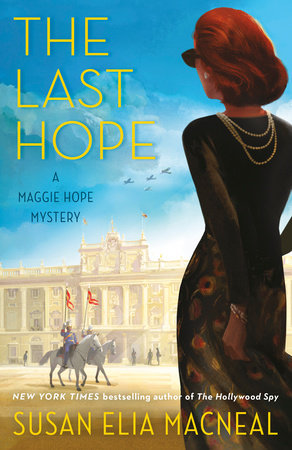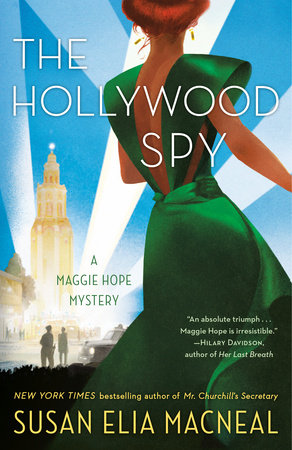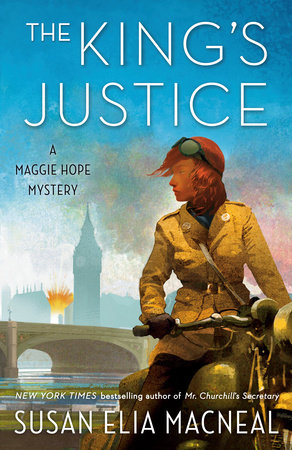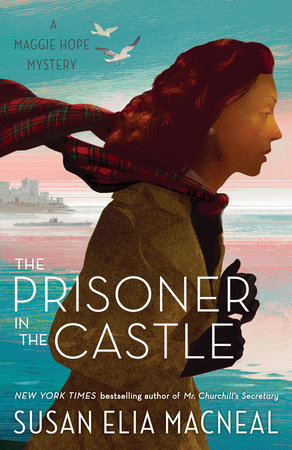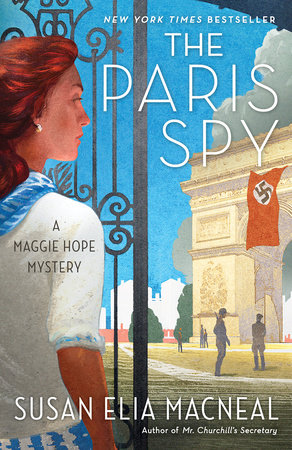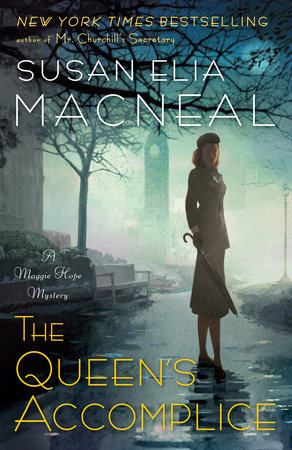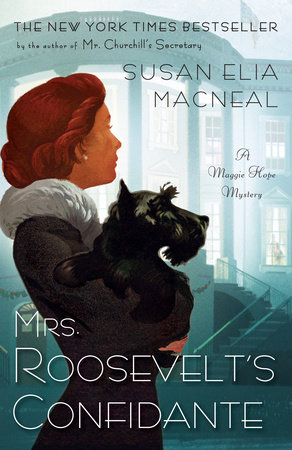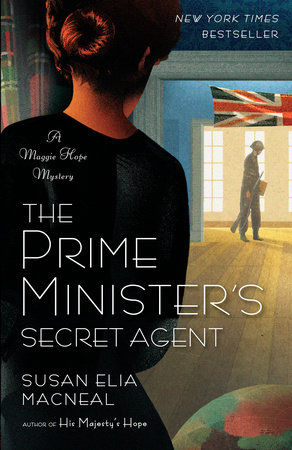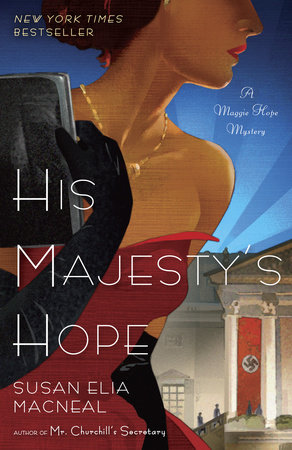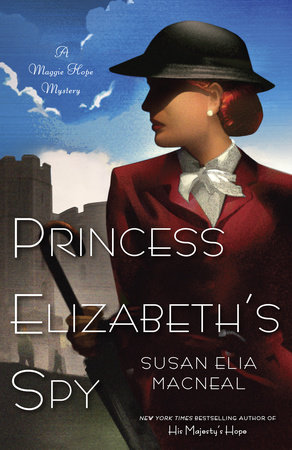Excerpt
The Last Hope
Chapter OneJanuary 1944Mornings in London were the exact opposite of those in Los Angeles, and Maggie Hope sometimes felt as if she were back in black-and-white Kansas after a whirlwind trip to Technicolor Oz. Yet in her bedroom in Marylebone, she smiled as she took in the length of the sleeping figure lying next to her: John Sterling. Her ex-fiancé. The man with whom she shared a . . . complicated past. And yet, now it seemed so simple, so easy. And you were there, too, she thought with amazement. In Los Angeles. And you’re still here, five months later. The radiator sputtered to life with a hiss and a series of loud clanks. John stirred, but didn’t wake.
Sitting up and tossing aside wool blankets, Maggie pulled on her robe and slippers and padded to the window to pull back the blackout curtains. She looked past the crisscrossed strips of gummed paper on the glass panes to glimpse an incandescently pink sunrise. Bare treetops bent in the east wind, and what had once been flower beds were now slumbering victory gardens.
Maggie spotted two boys, twins from the house across the street, who’d finally returned from their evacuation to the countryside. Before working as a typist to Mr. Churchill, she’d tutored them in math to earn money for the never-ending repairs her old house needed. Only a few schools had reopened, so they and the rest of the children ran wild from dawn until dusk. There was no traffic, since gasoline was still in short supply. Maggie watched as a young woman, bundled up in a huge coat and scarf, pushed a pram. She could hear the faint chatter of wrens in the bushes, as well as a siren in the far distance.
She remembered the first time she’d slept in this bedroom, after leaving her aunt Edith, her guardian, at Wellesley College in Massachusetts. Maggie pulled her robe tighter around her—how small and alone she’d felt. She had moved to London to try to sell her grandmother’s cold and empty house. Now the house was filled with friends, warm and familiar.
Growing up on the campus of a women’s college, a mathematics major, Maggie had always been surrounded by intelligent, thoughtful people who took ideas—and the women who had them—seriously. For Maggie, the cool beauty of mathematics had been a balm against the dizzying confusion of life. She’d been drawn to mathematical puzzles, fascinated by the Fibonacci sequence. She’d also always loved word games, doing crosswords in pen.
If she’d never left the United States, she’d probably still be in the ivory tower of academia, studying math. Not Princeton, as they didn’t admit women—and had refused to admit her—but at MIT, where she’d been accepted into the doctoral program in mathematics.
Still, when Maggie thought of herself as a graduate student, a Ph.D., she could only see herself as bookish and closed off. Cold. Living in a black-and-white world of numbers and theories. War was never good, she knew. Never. There was no “good” war. But she was proud to be “doing her bit,” with her friends and fellow Britons, and now the Allies, to fight a necessary war.
She’d worked as a typist for Prime Minister Winston Churchill in the summer of 1940, as bombs began to rain on London. Initially, she’d been ignored, but in noticing anomalies, asymmetrical patterns, she broke a hidden code. Breaking it, and fighting for the embedded message to be taken seriously, catapulted her into a career in intelligence, with missions in London, then Windsor, Berlin, Edinburgh, Washington, D.C., Paris, and last summer, Los Angeles.
She and John had visited her aunt Edith, a chemistry professor at Wellesley, on their way from Los Angeles back to London. “I approve, darling,” Edith had whispered in Maggie’s ear late one night after she’d said good night and kissed her on the cheek. It had felt like a blessing from her thoroughly starched English aunt.
Maggie looked around, taking in the details of her bedroom: the wainscoting, the blue-painted walls, the framed cover of a Wonder Woman comic her dear friend David Greene had given her in Washington, after they’d met President Roosevelt. A case full of beloved books. It was good to be home.
She padded back to bed, sitting next to John, who was now snoring softly. She bent down; he smelled faintly of sleep and bay rum aftershave and warm linen. “Good morning,” she whispered in his ear. His breathing didn’t change. She gazed at him sleeping, his long eyelashes, the dark stubble on his jaw. She kissed him gently on the forehead. “Good morning.” A kiss on the cheek and still nothing. One on the lips. “Good morning . . .”
With one arm, he swept her closer so she was on top of him, now giggling madly. “Good morning, you,” he murmured. But before they could kiss again, there was a loud banging on the bedroom door.
“Mimi! Mimi! Mimi!” called an insistent little voice. It was Griffin, her friends Chuck and Nigel’s son, and Maggie’s honorary nephew. The energetic toddler still couldn’t quite say “Maggie.”
“Sleeping, Griff!” Maggie replied.
She heard her friend and flatmate Chuck—really Charlotte Ludlow—say in her lilting Irish accent, “Come along, dear. Let Auntie Maggie be.” She could hear Griffin’s squealing protests as they made their way slowly and carefully down the creaking stairs. “Feet take turns!” Chuck said to Griff. “Feet take turns!”
When Maggie had moved into her late grandmother’s house, she’d had no idea it would become a home to so many displaced by war. And while Chuck pretended to be scandalized by John’s staying the night on occasion, Maggie clearly remembered the early days of Chuck’s romance with Nigel—and how he’d come traipsing into the kitchen for a cup of tea, often clad only in Chuck’s polka-dotted dressing gown.
There had also been Sarah, a ballet dancer for the Vic-Wells Ballet, who was now a Hollywood starlet. She’d recently moved to New York City to dance for the choreographer George Balanchine and audition for roles on Broadway.
And, of course, there had been Paige Kelly, her best friend from Wellesley, a Southern belle who’d worked as a typist for the United States’s ambassador to Britain, Joseph Kennedy, before the war. Oh, Paige, Maggie thought. It had been enough years that the sharp pain of her friend’s betrayal and death had softened, but it was always with her.
Before Maggie and John could resume their embrace, the telephone in the hall rang. John groaned and ran his hands through his curly, dark hair in frustration as Maggie shot out of bed. “Just a second,” she called back. “Could be work.”
The hall was cold, and she pulled her flannel robe closer around her. “Hello,” she said into the black Bakelite receiver.
“Kim Philby.” Harold Russell Philby, better known by his nickname, “Kim,” was never one to spend time chatting on the telephone.
“Hello, Kim.” It felt strange to use the first name of the head of the Iberian Section of MI-6. But he’d insisted, as he did with all his agents.
“Meet me at St. Ermin’s today,” he told her in his crisp upper-crust English accent. “Three o’clock.”
Maggie’s stomach flipped in anticipation at the words. “What’s happened?”
“New intel. The bar.” By which he meant Caxton.
She felt a tiny flicker of hope run through her like an electrical current. She didn’t like to be idle, and wanted to do whatever she could to help the war effort. She’d been promised her own mission, but time and again it had been held up. Maybe this time I’ll have my shot? “I’ll be there.”
In Los Angeles, Maggie received news that Chanel, whom she’d met on a mission in Paris in 1941, had requested her “services” as a courier. Since then, she’d been training with SOE. She’d used the time to refresh her spy skills, return to fighting shape, and study Spain’s history and politics, but she was more than ready to begin.
Still in bed, John stretched and yawned, letting the sheet fall to his waist, revealing broad shoulders and a lean torso. “Does this mean you have to go?” He gifted Maggie with one of his true smiles, a tender expression that lit up his face and made his brown eyes dance. It was the gentle and protective smile she’d fallen in love with, all those years ago. The look she was still in love with.
She grinned wickedly, then closed and locked the door. “Not quite yet.”


